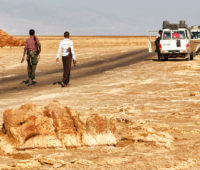On 9 January, a huge American AC-130 gunship dropped bombs onto the south-eastern tip of Somalia, one of the poorest and most neglected places on earth. The stated goal was the elimination of an al-Qaeda cell. At the time of writing, there is no evidence that the U.S. has succeeded in this; but there is […]
The Horn of Africa is one of the most complex and conflicted regions of the world. Each of the countries of the Horn—Somalia, Ethiopia, Eritrea, Djibouti and Sudan—suffers from protracted political strife, arising from local and national grievance, identity politics and regional inter-state rivalries. For 150 years, the Horn has also been a theater for strategic power struggles—the British Empire’s demand to control the Red Sea, Egypt’s attempt to control the Nile Waters, the Cold War confrontation in which each of the principal countries of the Horn switched sides at crucial junctures, and most recently the U.S. Administration’s “Global War on Terror.”
The rise of the Union of Islamic Courts in Somalia, the Ethiopian invasion to install the President Abdullahi Yousif in power, and the U.S. bombing raids aimed at suspected al Qa’ida members have again highlighted the turbulence of the Horn. The resurgent conflict in Somalia comes against the backdrop of a successful exercise in locally-driven reconstruction in Somaliland (north-west Somalia), an unresolved war between Ethiopia and Eritrea, internal political crises in both countries, and a host of active, latent and imminent conflicts in Sudan. Meanwhile, African institutions—notably the African Union, headquartered in Addis Ababa—are struggling to establish new principles and an architecture for regional peace and security.
This collection brings together social science analysis that delves beneath the news headlines into the complexities of the social and political crises afflicting the region.
Somalia: A New Front Against Terrorism
by Roland MarchalThe political crisis in Somalia reached the end of a cycle with the recent American-Ethiopian intervention. In the Horn of Africa, a new cycle has begun. Instead of making Somalia more secure, this intervention will, in the coming months, militarize opposing political and social groups in Somalia and beyond. For the third time since September […]












